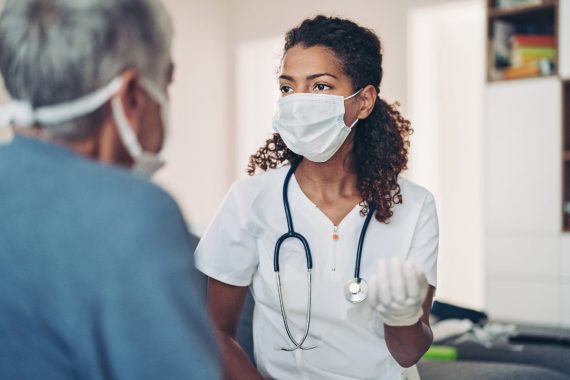GPs to continue LFTs until day 10 as Covid isolation reduced to five days

GPs and practice staff can return to work on day six of their Covid isolation in line with the public but with some additional mitigations, NHS England has said.
The new advice comes as the Government last week announced that people in England who have tested positive for Covid can end their self-isolation after five days if they test negative on a lateral flow test on day five and six from today.
An NHS England letter sent to GP practices on Friday confirmed that the general guidance applies to healthcare staff but that in order to return to work from day six, they must be ‘medically fit’ and test negative daily until day 10.
This is in line with previous guidance, when the isolation period was reduced from 10 to seven days in December.
Those who continue to test positive from day 10 and have no symptoms can return to work following a risk assessment, NHS England reiterated.
Guidance for GPs and practice staff on Covid isolation
In line with the announcement of changes to the self-isolation guidance for those who have received a positive COVID-19 test result, staff who test positive will be able to leave self-isolation and return to work, if they test negative on days 5 and 6 after the date of their initial positive test, 24 hours apart, and providing they are medically fit, from Monday, 17 January.
This means if a staff member tests negative on the morning of day 6 and was negative 24 hours earlier, they can return to work on day 6.
To mitigate any potential increased risk of transmission, NHS England and NHS Improvement require that all NHS staff then continue to test daily to day 10 after their initial positive test and stop at day 10 unless they remain or test positive.
For those that continue to test positive, if at day ten they still test positive they must continue to isolate and continue to daily lateral flow device (LFD) test until a negative result or until day 14*. If still positive at that point it is considered unlikely that they are infectious so they can return to work providing they are medically fit.
*The likelihood of a positive LFD test in the absence of symptoms after 10 days is low. Building on UKHSA advice, if the staff member’s LFD test result is positive on the 10th day or beyond AND the person has no symptoms, they can have a local risk assessment with a view to return to work, depending on work environment.
Source: NHS England
The letter added that NHS staff ‘should continue to access their tests via the universal offer online’.
It said: ‘UKHSA has assured us that there is sufficient supply to support any increase in testing and to provide access to tests in this manner. In extremis, regional testing leads will have a small supply of tests to be accessed on an emergency basis.’
It comes as NHS England last week suggested that GP access to Covid lateral flow tests ‘has improved’ following reports that practices were struggling to access them, despite the provision of a ‘contingency supply’.
Responding to the change in isolation guidance, the BMA has called for it to be accompanied by ‘wider infection control measures’, such as higher-grade PPE.
BMA public health medicine committee chair Dr Penelope Toff said: ‘All sectors, and in particular the health service, are experiencing disruption from widespread absences due to the rapid spread of Omicron but healthcare workers do not want to risk infecting colleagues and patients – many of whom are clinically vulnerable.
‘So they can only return to work safely after a shorter period of isolation and two negative lateral flow tests if they have access to high-grade masks, and many are finding that this is still not the case.’
She added: ‘Furthermore, easing self-isolation requirements alone will not resolve the sky-high level of infections in the community – which is the main driver of health service staff shortages – and with many people still not fully vaccinated, unvaccinated or with weakened immune systems, there is a significant risk of severe disease among these groups and of further variants of concern arising.’
Last week, it was reported that Covid pressures are forcing GPs to provide ‘urgent-only’ services in two areas, while a BMA survey revealed that almost 70% of GPs have seen staff shortages affect patient care.
Pulse July survey
Take our July 2025 survey to potentially win £1.000 worth of tokens











